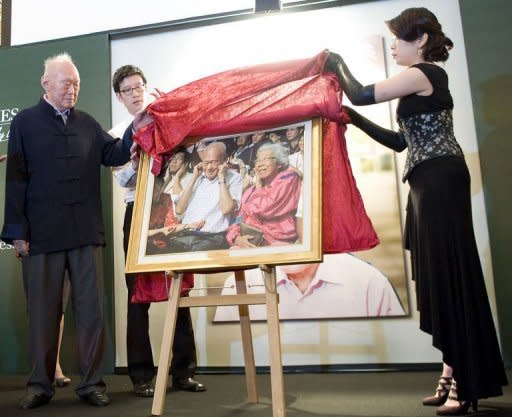Singapore's Lee wants home demolished
Singapore's elder statesman Lee Kuan Yew wants his family home torn down for redevelopment after he dies instead of being turned into a historical shrine. In excerpts from a new book launched Friday, Lee said he had already instructed the government to destroy the British colonial-era bungalow situated off the premier Orchard Road shopping belt after his death. "I've told the Cabinet, when I'm dead, demolish it," the 87-year-old Lee, who now advises his son Prime Minister Lee Hsien Loong, said in remarks published by the daily Straits Times. "I've seen other houses, Nehru's, Shakespeare's. They become a shambles after a while," he said, the former referring to India's independence hero Jawaharlal Nehru. The newspaper's parent company Singapore Press Holdings is publishing the book "Lee Kuan Yew: Hard Truths to Keep Singapore Going", based on exclusive interviews with Lee by Straits Times journalists. The famously frank and unsentimental Lee described his home -- built more than a century ago by a Jewish merchant -- as "a big rambling house with five bedrooms and three others at the back" and cracks in the walls. Lee, who gave the interviews before his wife Kwa Geok Choo died in October last year, said his family would not miss the house, which he has owned since the 1940s. "I don't think my daughter or my wife or I, who lived in it, or my sons who grew up in it, will bemoan its loss. They have old photos to remind them of the past," he said. Key meetings of what would become the ruling People's Action Party met in the house's basement to plot strategy during its formative years, the newspaper reported. The PAP has ruled Singapore since 1959, when the island gained self-rule from Britain, and its overwhelming majorities have allowed it to plan orderly successions thanks to its nearly total control of parliament. Under Lee, who served as prime minister from 1959 to 1990 and led Singapore to independence from Malaysia in 1965, the city-state underwent an economic miracle, at the same time maintaining a hardline policy on political dissent. He was pragmatic about the house's economic value. "Because of my house the neighbouring houses cannot build high. Now demolish my house and change the planning rules, go up, the land value will go up," he said in the interviews. Speaking at the launch of the book Friday, Lee, who now holds the title of Minister Mentor, said that Singapore remained "a nation in the making", despite its rapid rise to prosperity. "I do not deceive myself for one moment that our differences of race, culture, language, religion, have disappeared," Lee said, urging Singaporeans to preserve racial and religious harmony. "The message I want to convey is a simple one: we are a nation in the making. Will we make it? Am I certain we'll get there? No, we cannot say that. Something may go wrong somewhere and we'll fall apart," he said. Singapore, which prides itself on its political stability, has a predominantly Chinese population, with minority races including Malays and Indians plus a growing foreign community now comprising one-fifth of the population of five million. "You have a nation like China or Japan, China can be ravaged, demolished but the people come together again and rebuild. I'm not sure if Singapore were damaged, ravaged and demolished, they could ever come together again," said Lee. "So this precious, accidental, improbable, unlikely nation that we have created should be nurtured, carefully strengthened and built upon."



